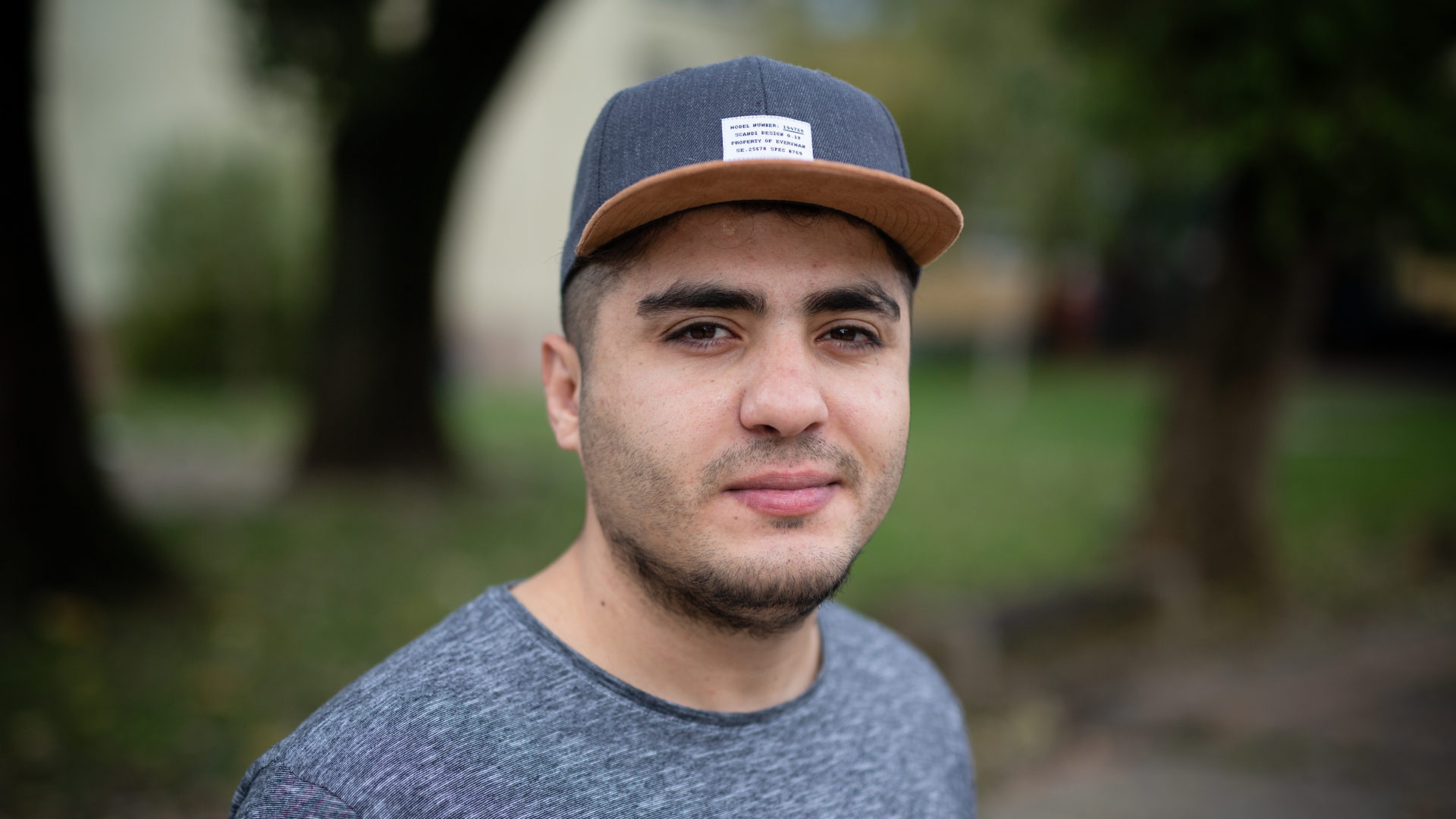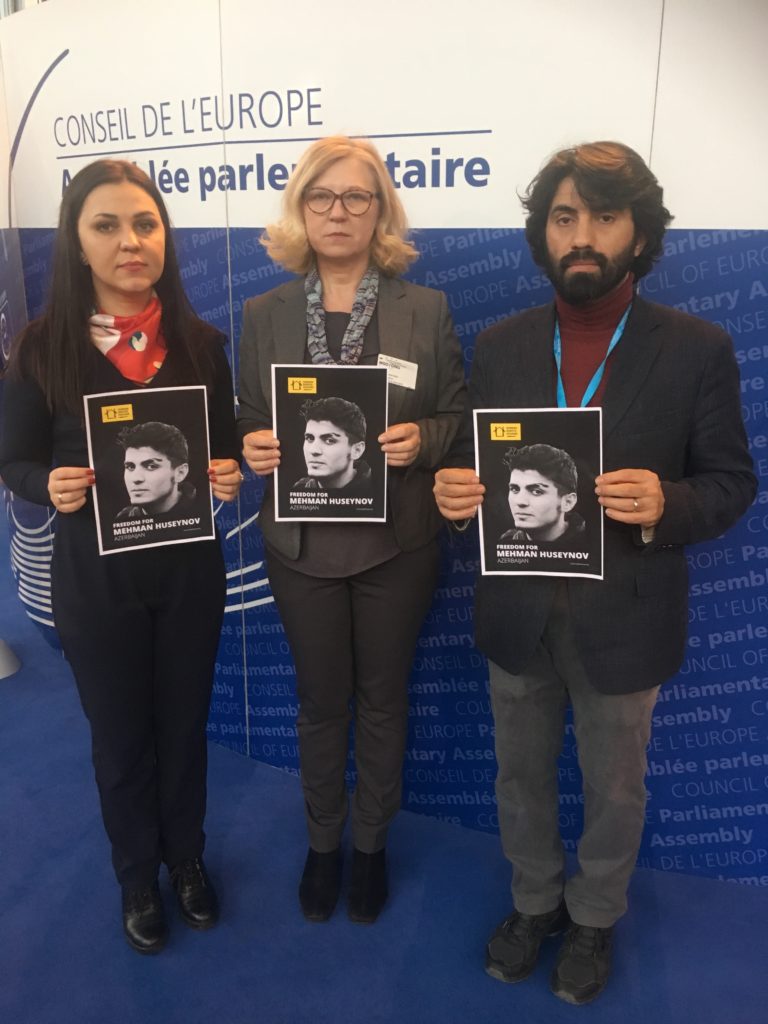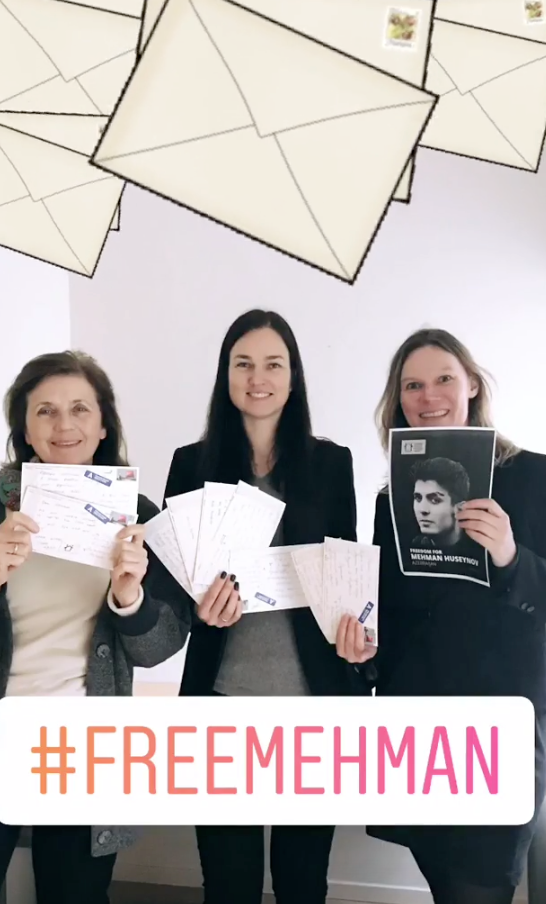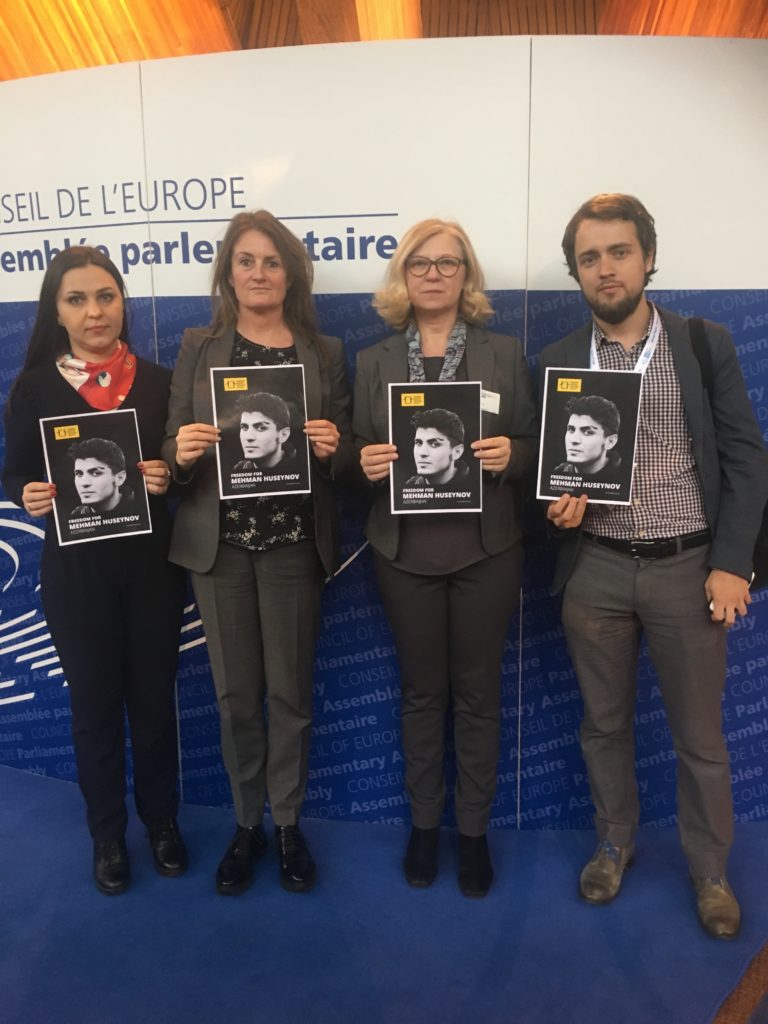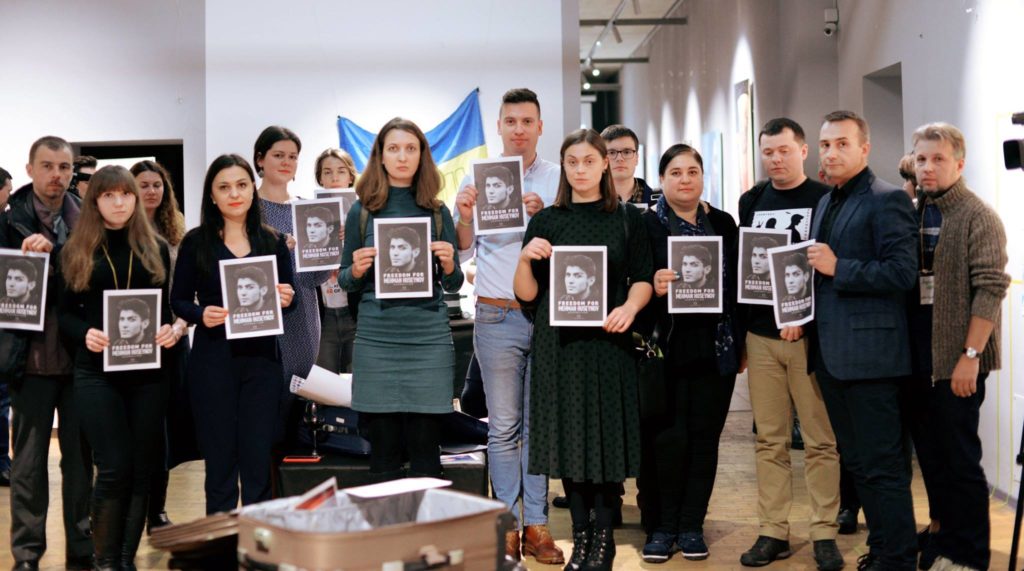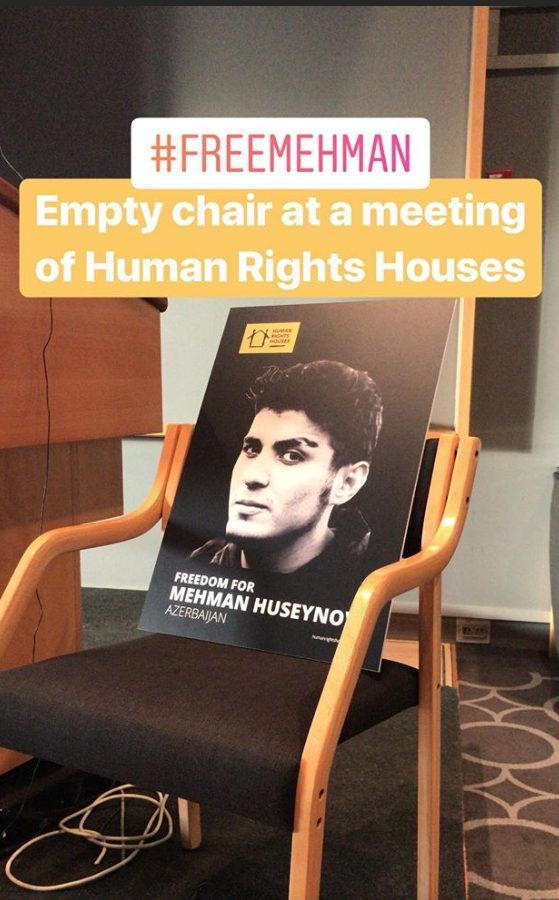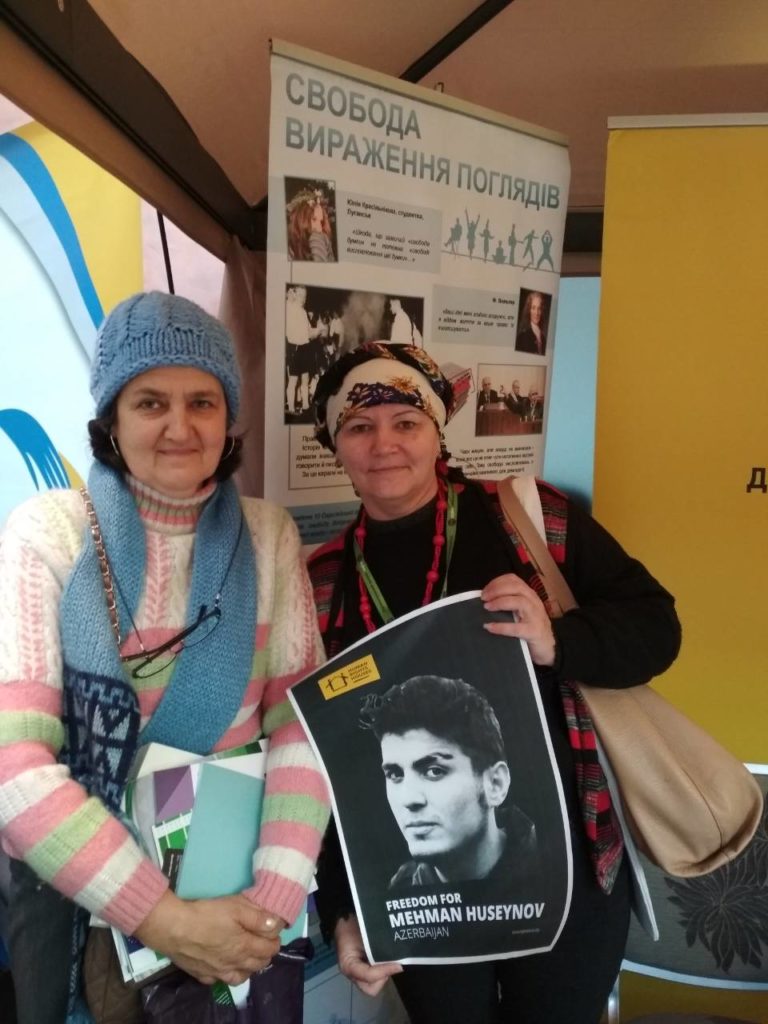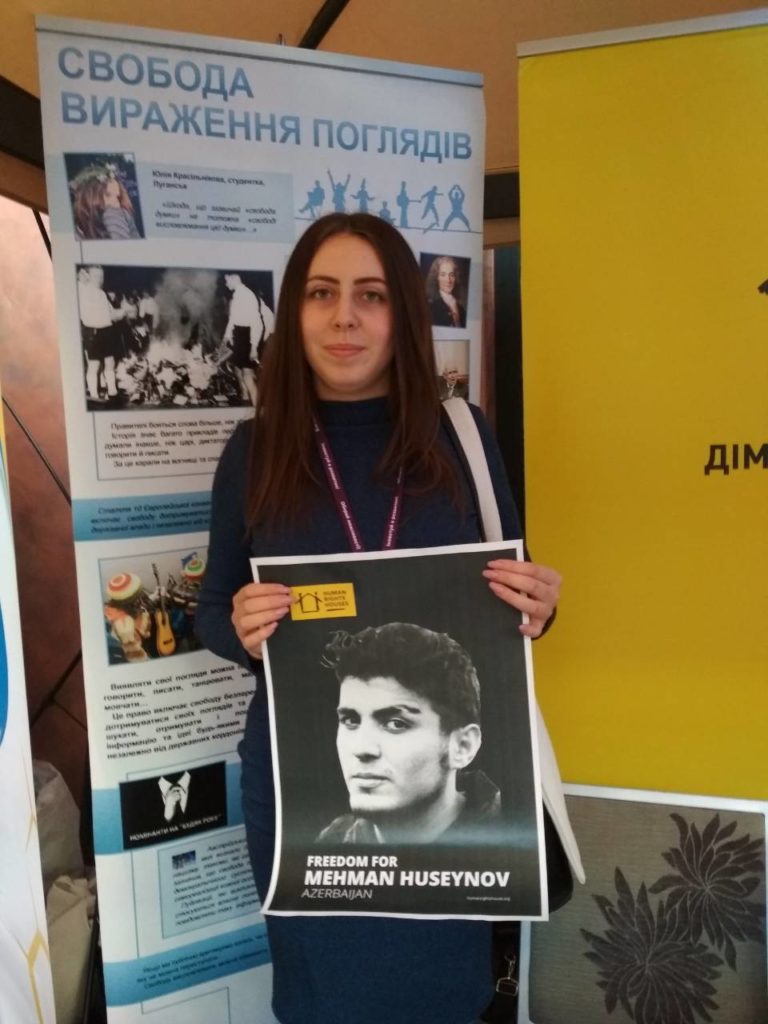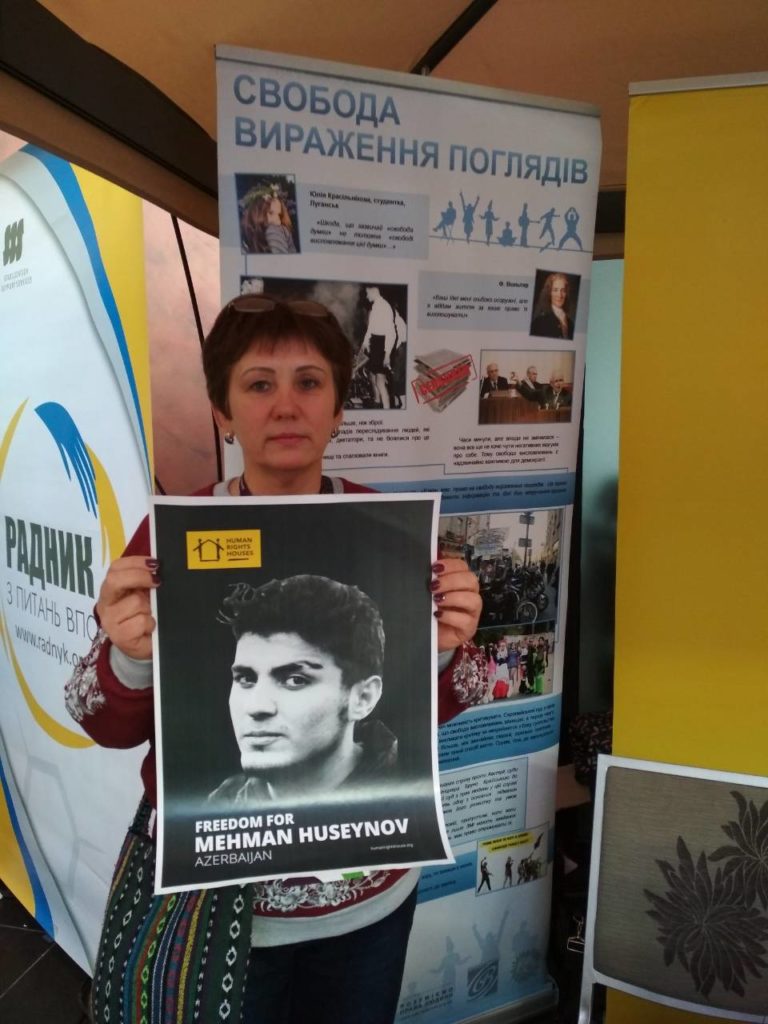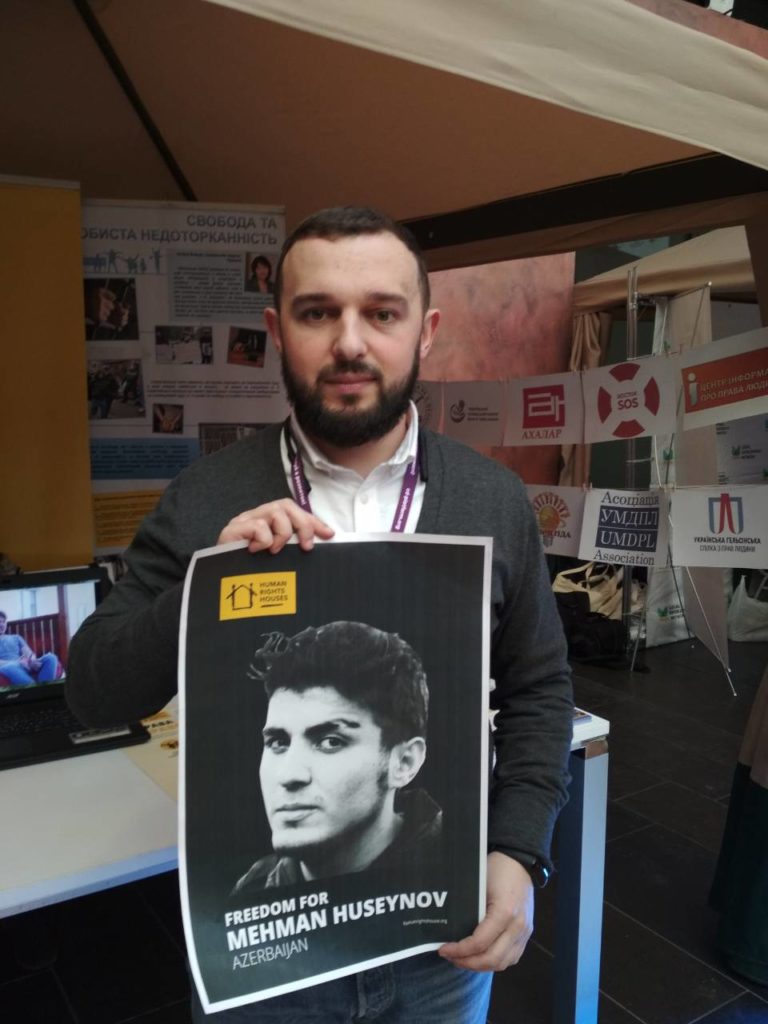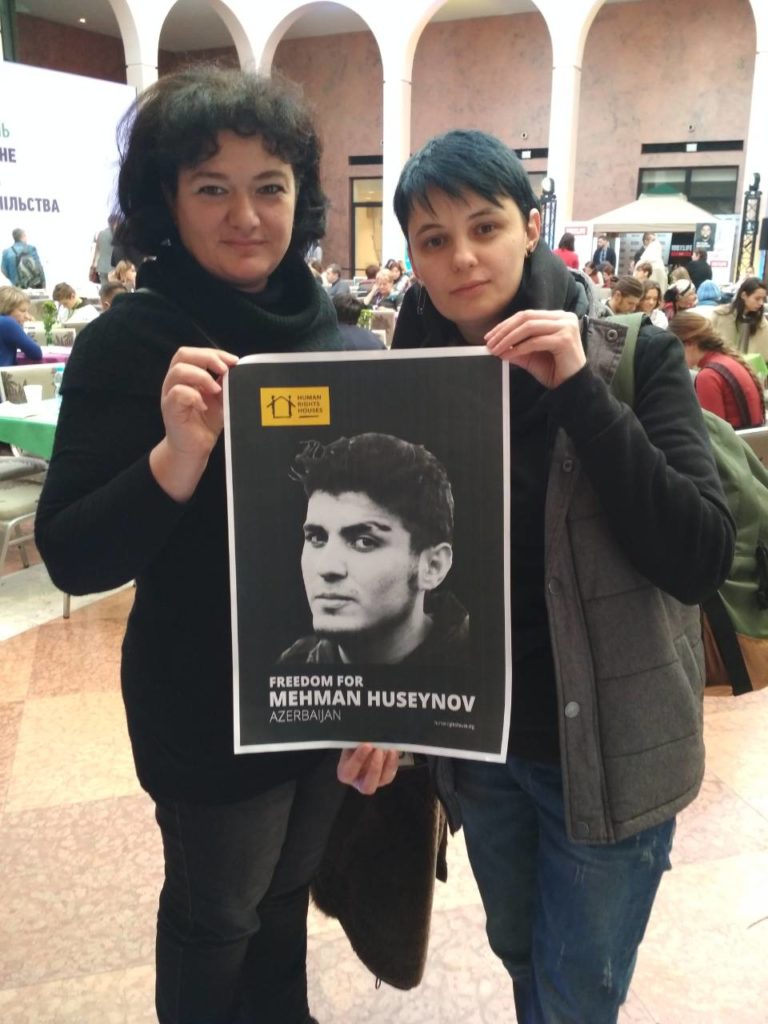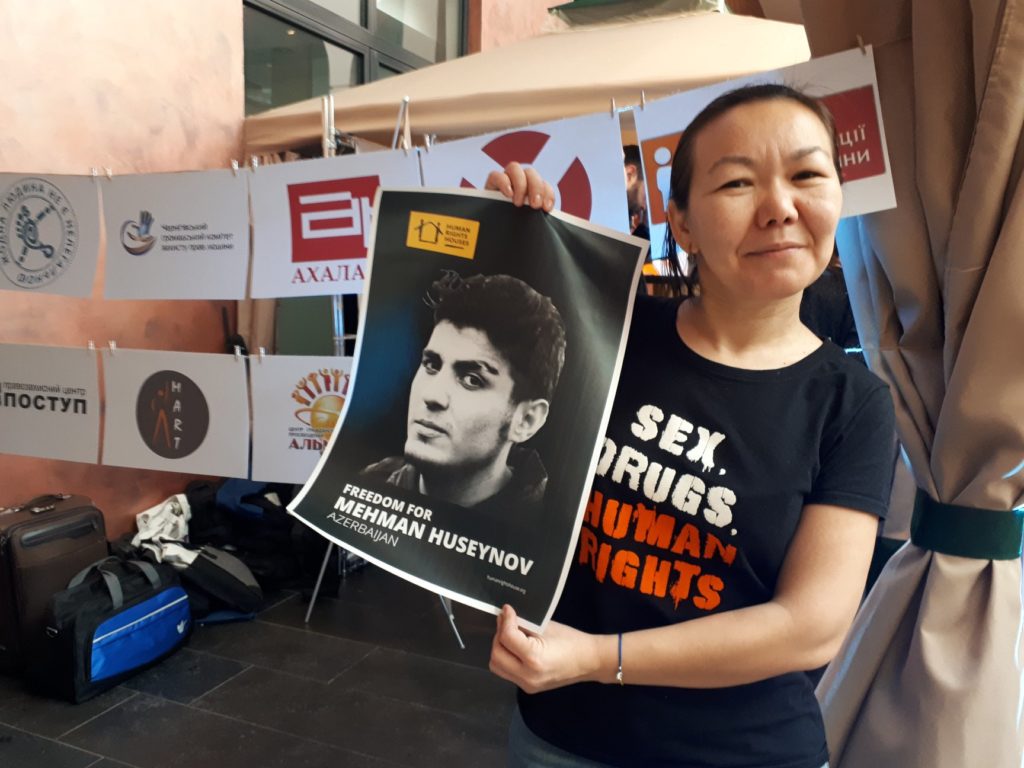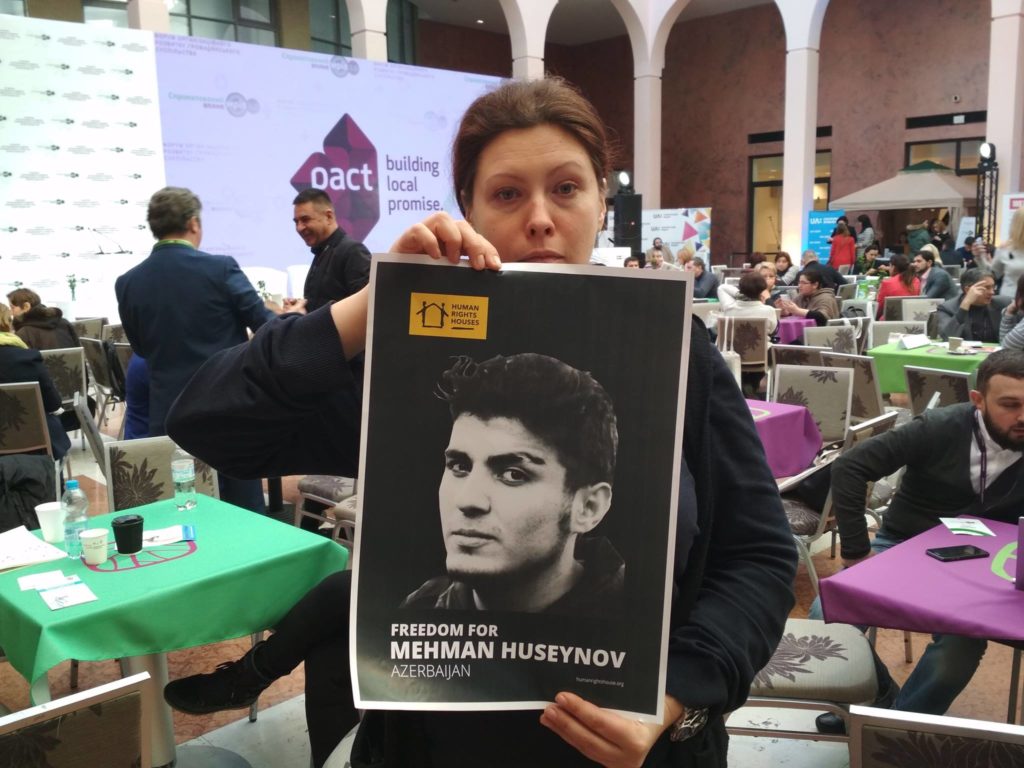Latest
[update 10 April 2019]
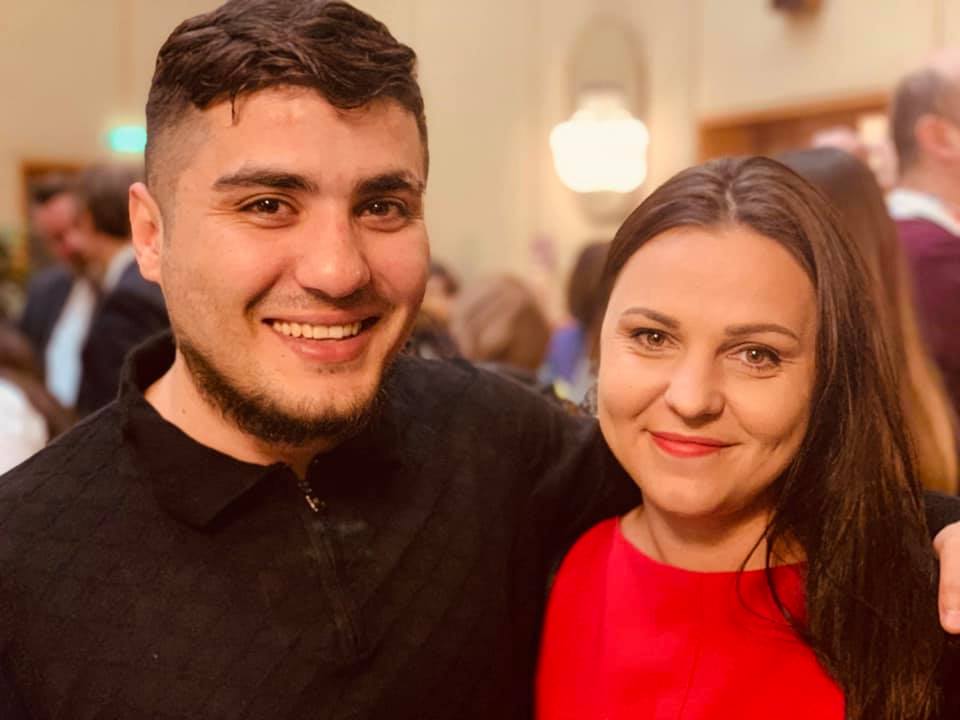
HRHF is so happy to see Mehman Huseynov reunited with his international colleagues after being permitted to leave Azerbaijan.
[update 9 April 2019]
On Tuesday 9 April, Mehman Huseynov was prevented from travelling out of Azerbaijan, being stopped at the airport on the way to attend a conference at the Council of Europe in Strasbourg.
Following his release from prison on 2 March, Huseynov applied for a passport which he received on 4 April. However, it appears that on his first attempt to use it, the travel ban against him that was instated in 2012 is still in effect.
Mehman Huseynov’s legitimate work as a journalist and human rights defender, including travel to international fora, is invaluable to the society he lives in. We again ask the authorities to immediately reinstate his rights and lift the travel ban against him.
[update 2 March 2019]
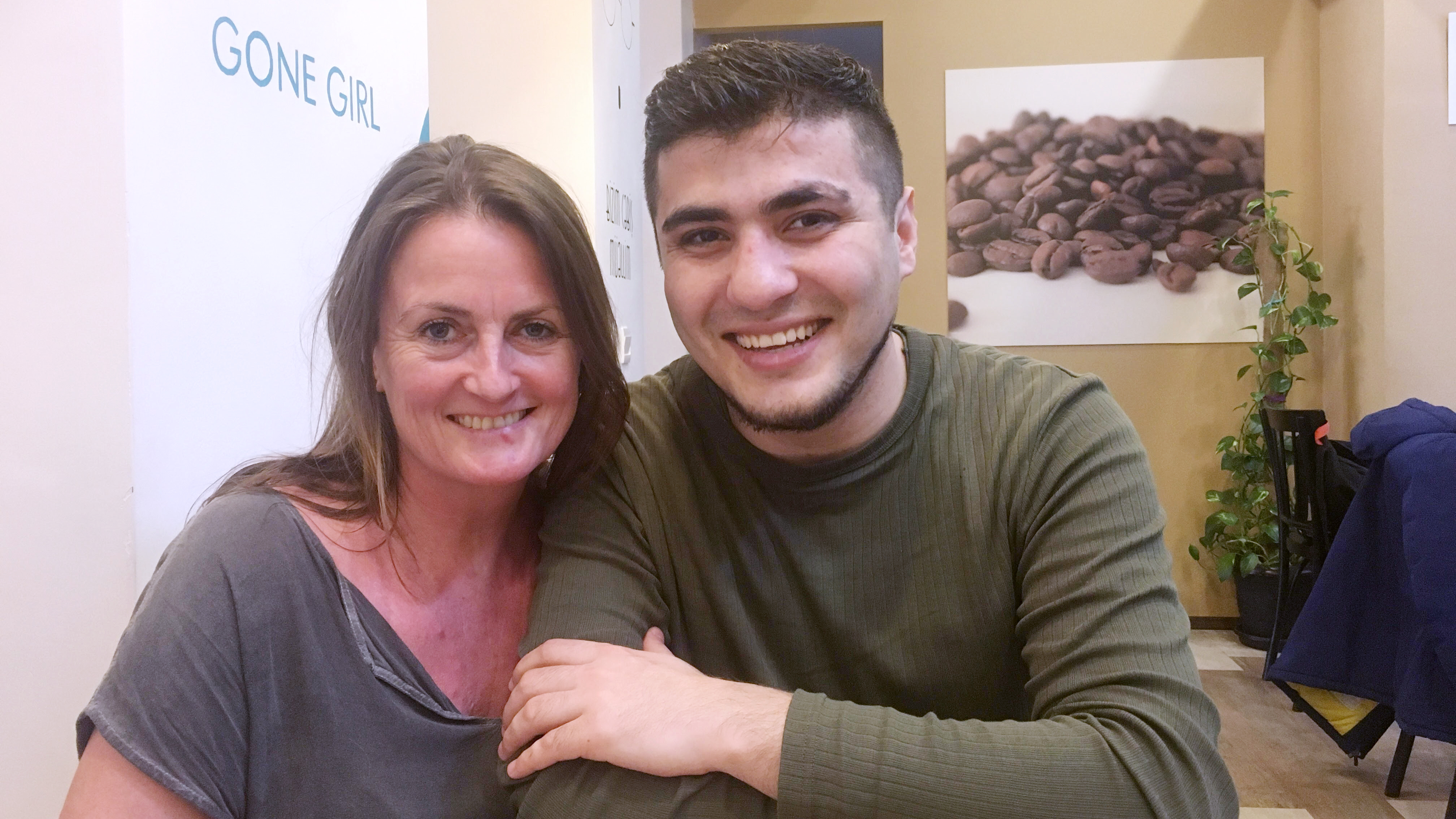
Maria Dahle, Director of HRHF, responds to Mehman Huseynov’s release from prison on 2 March.
“We are elated to see Mehman Huseynov released, walking freely as he is greeted warmly by friends, family, media and civil society; we look forward to being with him. As a journalist and human rights defender, Mehman Huseynov works to improve the society he lives in. His work is legitimate and important, and he should never have been imprisoned or faced threats and pressure for this.
To the authorities, we ask that his release marks not only an end to his imprisonment, but an end to the years of repression he has faced. We ask that they fully reinstate his rights and rehabilitate him, and lift the travel ban he has faced since 2012. We welcome indications that his identification and official documentation seized in 2013 have been returned.
We will find out fully in time whether the pressure against him has stopped and he has been treated respectfully since the new charges against him were dropped on 22 January. We also ask the Azerbaijani authorities to ensure the lawyers working to uphold Mehman Huseynov’s rights and those in other perceived politically sensitive cases are protected and able to carry out their professional functions without sanctions or threat of disbarment.
Many others remain in prison in Azerbaijan, targeted for exercising their rights to expression, association, and assembly. We urge the Azerbaijani authorities to release them and to end the targeting of journalists, human rights defenders, lawyers, bloggers, and activists. We say again, a free and fair democratic society does not have political prisoners.”
[Update 22 January 2019]
Maria Dahle, Director of HRHF, responds to the December 2018 criminal charges against Mehman Huseynov being dropped.
“While it is a positive development that Mehman Huseynov no longer faces a new criminal case, he has already been deprived of his freedom for two years on politically motivated charges. When he is released, by latest 2 March 2019, he will continue to live with the effects of the repression that has escalated against him for many years.
To the authorities, we ask that they ensure Mehman Huseynov’s safety in Azerbaijan and end the campaign of repression against him. We ask that they fully reinstate his rights and rehabilitate him, and lift the travel ban he has faced since 2012 and return his identification and official documentation seized in 2013. The lawyers working to uphold his rights should also be protected, able to carry out their professional functions without sanctions or threat of disbarment.
We must not forget other political prisoners in Azerbaijan. We call for their release and for an end to the repressive system that targets journalists, human rights defenders, lawyers, bloggers, and activists. A free and fair democratic society does not have political prisoners.”
Letters to the President of Azerbaijan and the international community
On 10 January, Human Rights House Foundation wrote to the President of Azerbaijan, Ilham Aliyev, appealing for his personal intervention in the case. This letter is available in Azeri and in English.
The following day, some 41 member and partner NGOs of 13 Human Rights Houses issued a joint letter calling for urgent action from the international community to ensure the life, health, and rights of Mehman Huseynov.
[Update 17 January 2019]
On 17 January, at the European Parliament (EP), an overwhelming majority of MEPs supported an urgent resolution on Mehman Huseynov, calling for “the immediate and unconditional release of Mehman Huseynov and urging the Azerbaijani authorities to drop all new charges against him.” The EP also expressed concern of Huseynov’s health and stated that “the authorities must provide all the necessary professional medical assistance and allow regular access for his family and privileged legal counsel.”
Overwhelming majority of #MEPs supports urgency resolution on #MehmanHuseynov case in #Azerbaijan – just adopted! Full text: https://t.co/ezeBet068a pic.twitter.com/LCSEEByWUi
— Human Rights House Foundation (@HRHFoundation) January 17, 2019
Significantly, the EP in the resolution also called for “an end to the arbitrary disbarment of lawyers representing members of the opposition and human rights activists.”
HRHF has warned that lawyers who take politically sensitive cases in Azerbaijan face threats and disbarment, and remains deeply concerned that the same actions may be taken in retaliation against the two lawyers continuing to represent Mehman Huseynov.
Published 11 January 2019
Due to be released on 2 March 2019, new charges of “using violence to resist a person in authority” could mean he serves up to a further seven years in prison, in addition to the almost two he has already served on charges of defamation – for reporting that he was tortured while in police custody on 9-10 January 2017.
The case against him is widely viewed as politically motivated, and Huseynov maintains his innocence. For many years he has been targeted by the authorities and the actions against him show a timeline of escalating repression aimed at silencing him. Throughout his trial for defamation and related appeals, he found no justice in the Azerbaijani Courts, and this adds to concerns that new charges will lead to a lengthy sentence – regardless of their basis in truth.
New charges (26 December 2018)
Due to be released on 2 March 2019 following a two-year sentence for defamation, Huseynov was charged on 26 December with article 317.2 of the Azerbaijani Criminal Code for “using violence to resist a person in authority” and could face an additional five to seven years in prison.
The prison authorities accuse him of physically abusing a prison guard to avoid a routine check on 26 December 2018. According to one of Huseynov’s lawyers, he denies the accusation by any means, claiming that he did not even get close to the prison guard. He adds that while in prison, since August 2018, several attempts have been made to provoke him into conflict and it was clear that there was a special plan for that purpose.
International reaction to new charges
PACE Co-Rapporteurs on political prisoners in Azerbaijan asserted on 4 January 2019 that there are “justified grounds for the assumption that these new charges are clearly politically motivated and clearly designed to further silence a prominent human rights activist.”
Council of Europe Commissioner for Human Rights, Dunja Mijatović, discussed Huseynov’s case Azerbaijan’s Deputy Minister of Foreign Affairs on 7 January 2019: “I told the Deputy Minister that the authorities should drop the charges initiated against Mr Huseynov on 26 December because they lack credibility.” She also stated that “the authorities are under the obligation to provide the necessary medical care to Mr Huseynov whose conditions are extremely worrying. For this reason he should be transferred to a civil hospital where he can receive the necessary medical care.”
Many international human rights organisations and media outlets have issued statements calling for the charges to be dropped immediately.
Hunger strike starting 26 December 2018
Huseynov began a dry hunger strike on 26 December 2018 to protest against the new trumped-up charges against him. When his lawyers met him on 28 December 2018, they reported that he was in a bad condition and barely spoke. He had not eaten or drunk anything for two days and claimed he would continue with his hunger strike until the charges are dropped.
According to his lawyer, on 30 December 2018 at 3-4 pm, his health condition deteriorated as a result of five days on dry hunger strike and he lost consciousness. He was visited by doctors who concluded that he needs urgent surgery because of vein problems in his leg. But his condition for surgery was not appropriate. A number of medical measures were taken, and it was recommended that he drink water.
Human Rights House Foundation is not able to confirm the details of the hunger strike beyond the 30 December.
Denial of access to lawyers
Huseynov was placed in isolation on 26 December 2018 and informed he would face criminal charges. His lawyers were prevented from visiting him until 28 December 2018, when he was already in a critical condition due to the dry hunger strike.
His lawyer went to the detention centre N14 on 27 December 2018, where she was told that Huseynov had been taken to solitary confinement and that a meeting with him would need a special request from “above”. His lawyer claimed this justification was illegal as a lawyer possesses an unrestrained right to meet their client regardless of the place where the prisoner is detained. Ultimately, despite protests, his lawyer was unable to meet with him on 27 December 2018. After a special request, Huseynov’s lawyers met with him on 28 December 2018.
Huseynov had been transferred to Baku pre-trial detention centre by 30 December 2018 according to his lawyer. The transfer to the pre-trial detention is connected with the preliminary investigation against him in the new criminal case.
Official information issued by Azerbaijani authorities
According to the statement from the Penitentiary, issued on 7 January 2019, Mehman Huseynov is currently in Kurdahani detention centre nr 1 drinking water and eating bread. He is allowed to meet with his lawyer and to talk with his family members on phone. According to the authorities’ statement, his health is normal.
According to news agency Caucasian Knot, representatives from the Azerbaijani Ombudsperson Office have visited Mehman Huseynov in the detention centre and can confirm that he is drinking and that his health is monitored by doctors.
#FreeMehman
Mehman Huseynov is an Azerbaijani anti-corruption video blogger who has for years been targeted by authorities. He remains in prison almost at the end of a two-year sentence for defamation. In response to the now dismissed spurious criminal charges that could have kept him in prison for a further seven years, he began a hunger strike on 26 December 2018.
Human Rights House Foundation expressed deep concern about his critical situation and his imprisonment, and the psychological pressure and new criminal charges pursued against him.
Letters to the President of Azerbaijan and the international community
On 10 January, Human Rights House Foundation wrote to the President of Azerbaijan, Ilham Aliyev, appealing for his personal intervention in the case. This letter is available in Azeri and in English.
The following day, some 41 member and partner NGOs of 13 Human Rights Houses issued a joint letter calling for urgent action from the international community to ensure the life, health, and rights of Mehman Huseynov.
Years of escalating pressure
Mehman Huseynov’s well-publicised abduction in January 2017 and later sentencing for defamation were not the beginning of the pressure against him, and with the new charges, we see that they are not the end.
Years of escalating pressure have forced an ambitious young man wanting to improve Azerbaijani society to now be in a critical situation in prison, with actions against Huseynov strongly linked to his human rights and anti-corruption work. This is a situation that has gone too far, for both Mehman Huseynov and for Azerbaijan.
Show your support
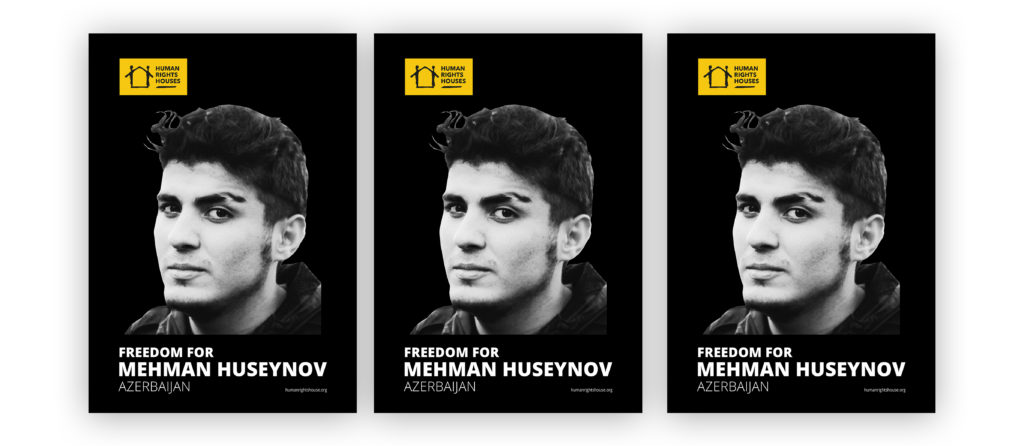
On 2 November 2018, marking the international day to end impunity for crimes against journalists, HRHF launched this solidarity action in support of Mehman Huseynov.
About Mehman Huseynov
https://www.youtube.com/watch?time_continue=1&v=qiQA83hpJoU
In the video above: Mehman Huseynov interviews male members of the public whether they would make their wife vice-president if they were president of a large company, referencing President Ilham Aliyev’s appointment of his wife to the position of vice-president on 21 February 2017. Published 1 March 2017.
Who is Mehman Huseynov?
Mehman Huseynov is an Azerbaijani photojournalist, video blogger, and human rights defender. He reaches out to everyday citizens through his videos, where his personal touch and sense of humour have earned a substantial following on his social media accounts. His valuable commentary has been essential in stimulating debate on issues affecting Azerbaijanis.
Through his work, Mehman Huseynov challenges the crackdown on independent media in Azerbaijan, and has become a symbol for the fight for free expression in the country.
His unique style of journalism and focus on self-publishing has helped him to reach large audiences with almost two million views on his YouTube channel. In 2013, he began posting on Facebook, under the name SANCAQ, where he now has more than 335,000 followers, his SANCAQ Instagram account has more than 167,000 followers. Since his imprisonment, his social media accounts have been taken over by his brother, Emin Huseynov.
His work as a photojournalist has been used by news outlets, magazines, and NGOs alike, including in particular his coverage raising awareness of the human rights situation surrounding the Eurovision song contest and the authorities’ crackdown on peaceful protests in the country at the time (Sing for Democracy campaign). Mehman Huseynov was awarded in 2013 with the Free Media Award from Fritt Ord Foundation and the ZEIT-Stiftung. He was awarded for one of top three photos in the first annual Freedom House photography and art contest in 2012, and received an award as part of “Youth in Action: a Snapshot of Democracy” contest by the World Movement for Democracy in 2012. He was one of the 2010 winners of the Democracy Photo Challenge by the US State Department. In 2019, he was among 15 human rights defenders and organisations shortlisted for the Index on Censorship Free Expression Awards in the “Journalism” category.
IRFS (from 2006)

The story of the Institute for Reporters’ Freedom and Safety (IRFS) is intrinsic to the story of its chairperson Mehman Huseynov. The organisation was established in 2006 by journalists Emin Huseynov and Rasim Aliyev in response to growing restrictions on freedom of expression and freedom of press in Azerbaijan.
IRFS has constantly been at the forefront of protecting targeted journalists and raising awareness of the dire situation of expression in Azerbaijan. All three of IRFS’ leaders have been targeted as a result of their work with one in exile, Mehman Huseynov in prison, and one dead following a violent attack.
In 2014, Emin Huseynov, the organisation’s then chairman, was forced into hiding in the Swiss embassy for 10 months and until he was able to flee Azerbaijan. During this time, the authorities targeted his brother Mehman, as well as interrogating their mother.
The next chairman of IRFS, journalist Rasim Aliyev, died after being violently attacked in August 2015 in Baku. The attack has been linked to his work exposing police brutality and social discontent.
In November 2016, Mehman Huseynov was elected as IRFS’ new chairman.
Yet, it was many years before – in his teenage years – that Mehman Huseynov became involved with IRFS through his brother. This began his journey from a photographer, to a journalist, to the chairman and popular video blogger that he is today.
This journey of professional development has been hindered and marred by harassment. Prior to his first arrest in 2012, Mehman Huseynov had been the target of police questioning related to IRFS and its activities.
On 7 March 2011, Mehman Huseynov and Abulfat Namazov from the Institute for Reporters’ Freedom and Safety (IRFS) were interrogated by police, for two hours after being forced out of their car in Baku. They were questioned about Huseynov’s Facebook account, a protest action on 11 March and the activities and employees of the IRFS. The police advised Huseynov to be less active on social media networks.
Mehman Huseynov was first arrested on accusations of hooliganism on 12 June 2012 linked to a verbal disagreement with police at an unsanctioned protest in front of the Baku Mayoral Office that occurred on 21 May 2012. He was at the event carrying out his professional duties, when police used force against both protesters and journalists, including Mehman Huseynov and other IRFS employees. The police broke the camera that Mehman Huseynov was using at the event.
Linked to this, he received a travel ban, which he discovered at Baku airport on 17 June 2013 when he attempted to travel to Norway. This travel was to receive the Fritt Ord and ZEIT-Stiftung Free Media Award.
On being detained at the airport, he was taken to the police station in Baku, where authorities confiscated his official documents and ordered him to sign a pledge that he would not leave Azerbaijan. Since then, he has been regularly interrogated by authorities and remains under the travel ban and without documents. Living without identification and official documentation has closed the country’s infrastructure to him, preventing him from accessing things such as public healthcare and further education.
IRFS has been behind several joint initiatives in Azerbaijan, such as the online TV channel, ObjectiveTV, which received the Fritt Ord and ZEIT-Stiftung Free Media Award in 2014. In 2009, IRFS became a formal member of Human Rights House Azerbaijan, as well as a member of the regional cooperation platform, the South Caucasus Network for Human Rights Defenders. IRFS is also a member of IFEX.
In addition to attacks, threats and harassment against its staff and their family members, the organisation has suffered from administrative blocking of the organisation from being able to operate in Azerbaijan.
Sing for Democracy (2012)
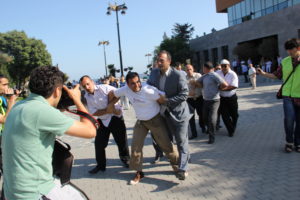
In May 2012, his work as a photo journalist covered the “Sing for Democracy” action, in response to the Eurovision Song Contest held in Baku that month.
As Mehman Huseynov and other independent journalists reported on violations committed by Azerbaijan as they prepared in Baku to host the Eurovision Song Contest, Ali Hasanov, a spokesperson for the Presidential administration made a speech at a conference on the role of NGOs in the development of civil society where he said “opposition activists, journalists and media outlets shouldn’t feel dared to go out to the city and they should be felt ashamed. Public hatred should be demonstrated against them, so they do not show the destroyed asphalt to foreign journalists, but instead take these journalists to IDP camps.”

Crackdown on independent civil society and media intensifies (from 2013)
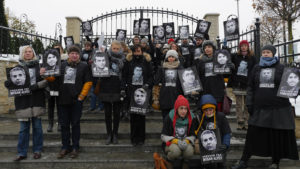
Freedom of expression is severely limited in Azerbaijan, and there has been an active crackdown on independent civil society and independent media which intensified 2013. This has led to many working journalists and human rights defenders being attacked, imprisoned, and fleeing the country, especially those working on perceived sensitive issues such as inequality and corruption.
These are the issues that the authorities have sought to remove from the public space through the crackdown on and repression of civil society, the shutting down of protests, and the targeting of political opposition.
By continuing to actively publish independent and critical work as a video blogger and photo journalist on such sensitive issues, Mehman Huseynov resisted these restrictions, stepping up to fill the void left behind by those in prison and exile by putting himself at risk to provide essential, independent commentary to the people of Azerbaijan.
Abduction (9 January 2017)
Mehman Huseynov, was pushed into a vehicle in Baku, Azerbaijan, on 9 January. He was then abducted by police agents and faced administrative charges of resisting police.
According to eyewitnesses, Mehman Huseynov was forcibly dragged into an unmarked vehicle and taken to an unknown destination by unidentified assailants in civilian clothes, as reported by IRFS and the Campaign to Free Political Prisoners.
He was released the next day. The court in Baku fined him 200 AZN (around 100 euros) for “disobeying the police.”
Prior to the abduction, Mehman Huseynov became the chairman of IRFS in November 2016. In December 2016, he shared a video in which he contrasted the financial difficulties of elderly citizens with the “palaces” built by members of the government.
Video above from Mehman Huseynov’s YouTube channel, video published on 13 December 2016.
Just months before, on 10 September 2016, he was taken to a police station and interrogated and threatened with torture.
Sentenced for defamation (3 March 2017)
On being released by police after his abduction, Mehman Huseynov reported that he was tortured – which is consistent with the findings of an examination by an independent team of medical doctors, sent from Front Line Defenders and the Georgian Centre of Psychological and Medical Rehabilitation for Torture.
He was sentenced to two years in prison for defamation on 3 March 2017, based on him reporting that he was tortured while in police custody.
At the time of his sentencing, HRHF responded: “Mehman Huseynov has been sentenced to two years imprisonment because he dared to say in Azerbaijan… that he should not be tortured, he should not be arrested, and in fact he should be free to do his work.”
HRHF also pointed to the absurdity of it being illegal to resist one’s own abduction, in an op-ed for Meydan TV.
Mehman Huseynov maintains his innocence and has called the case against him politically motivated. His sentencing came amid sustained attacks on media freedom in Azerbaijan, such as against the Turan news agency and Azadliq newspaper, and their staff. Prior to him being sentenced on 3 March 2017, he was active in his work.
Immediately prior to his sentencing for defamation, he published a video on 1 March 2017 asking male members of the public whether they would make their wife vice-president if they were president of a large company. The video contributed to the public debate around President Ilham Aliyev’s appointment of his wife to the position of vice-president on 21 February 2017. On 2 March 2017, he delivered a speech at the memorial service of journalist and editor-in-chief of Monitor magazine Elmar Huseynov (no relation), who was murdered in 2005.
On 9 March 2017, 50 member and partner NGOs of Human Rights Houses wrote to the Azerbaijani President and authorities to call for the immediate and unconditional release of Mehman Huseynov.
Appeals
Observers from Human Rights House Tbilisi have attended and reported on Mehman Huseyov’s appeal hearings.
Appeals against sentence for defamation
Mehman Huseynov has appealed at all levels of the Azerbaijani court system against his sentence for defamation. Bringing this process of domestic appeals to an unjust and unsatisfactory end on 25 June 2018, the Supreme Court Azerbaijan upheld Huseynov’s two-year sentence. All allegations of torture were dismissed and not considered further by the courts.
Throughout his trial for defamation and related appeals, he found no justice in the Azerbaijani Courts, and this adds to concerns that new charges (put forward on 26 December 2018) will lead to a lengthy sentence – regardless of their basis in truth.
On 12 April 2017, during a three-day hearing at the Court of Appeal, Mehman Huseynov was allowed to speak. He recalled the persecution against him since 2012, and details of how he was tortured. He then said:
“I am not here only for myself; I am here so that your children are not in my place tomorrow. If you uphold the judgement against me, you have no guarantees that you and your children will not be in my place tomorrow.”
Observers from Human Rights House Tbilisi have attended and reported on Mehman Huseyov’s appeal hearings.
The Azerbaijani courts of first and second instances found Huseynov guilty for criminal defamation, under article 147.2 of the Criminal Code of Azerbaijan, for statements he made alleging torture while in police custody.
The police chief of the station where Mehman Huseynov was detained took the allegation as a personal insult and pursued a charge for defamation. However, Mehman Huseynov’s defence has repeatedly asserted that the charge implies defamation against a concrete individual, while Mehman Huseynov in his statement did not mention individuals but criticised the system generally.
While the Courts allowed Huseynov to give a statement during his appeal hearings, they rejected all other motions put forward by his lawyers. These motions included for the restrictive measures to be changed and Huseynov freed, for him not to be held in a cage, for the Court to investigate video evidence, and for the police chief who brought the case for defamation to testify in Court.
Appeals for release on probation
Mehman Huseynov appealed for conditional release in August 2018, having completed two-thirds of his sentence. The District Court rejected this on accusations of bad behaviour by an employee of the prison facility where he is held. In an appeal hearing on 10 October 2018, his defence unsuccessfully petitioned for this employee to attend the next court hearing on 17 October. Another employee of the prison attended the hearing on 10 October in his place.
During the hearing, Mehman Huseynov complained of psychological pressure towards him. According to his defence, he was not allowed to make phone calls and he had been made to understand that he can be punished for informing other prisoners about their rights.
Mehman Huseynov’s hearing at the Appeal Court continued on 17 October 2018. The Court did not satisfy his appeal for conditional release and upheld the decision by the District Court.
Mehman Huseynov attended the hearing, commenting that he had given advice to other prisoners and that he was summoned by the administration and made to understand that he can be punished for explaining rights to other prisoners. He explained that for this reason he decided to stay apart from other prisoners – another violation claimed by the prison administration.
During the hearing, his defence stated that he had not breached the order of the penitentiary facility nor did he have any disciplinary misconduct. His lawyer also indicated that it is voluntary to participate in different activities in prison and that it is wrong to present non-participation as a violation, as done so by representatives of the prison administration when setting out grounds to reject Mehman Huseynov’s appeal.
The lawyer reminded the Court that Article 6 (right to a fair trial) of the European Convention on Human Rights supports a prisoner’s right to conditional release.
Thumbnail photo: Turan


